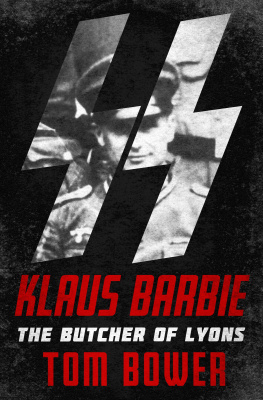McFarren Peter - The Devils Agent: Life, Times and Crimes of Nazi Klaus Barbie
Here you can read online McFarren Peter - The Devils Agent: Life, Times and Crimes of Nazi Klaus Barbie full text of the book (entire story) in english for free. Download pdf and epub, get meaning, cover and reviews about this ebook. year: 2014, publisher: Xlibris US, genre: Politics. Description of the work, (preface) as well as reviews are available. Best literature library LitArk.com created for fans of good reading and offers a wide selection of genres:
Romance novel
Science fiction
Adventure
Detective
Science
History
Home and family
Prose
Art
Politics
Computer
Non-fiction
Religion
Business
Children
Humor
Choose a favorite category and find really read worthwhile books. Enjoy immersion in the world of imagination, feel the emotions of the characters or learn something new for yourself, make an fascinating discovery.

- Book:The Devils Agent: Life, Times and Crimes of Nazi Klaus Barbie
- Author:
- Publisher:Xlibris US
- Genre:
- Year:2014
- Rating:3 / 5
- Favourites:Add to favourites
- Your mark:
- 60
- 1
- 2
- 3
- 4
- 5
The Devils Agent: Life, Times and Crimes of Nazi Klaus Barbie: summary, description and annotation
We offer to read an annotation, description, summary or preface (depends on what the author of the book "The Devils Agent: Life, Times and Crimes of Nazi Klaus Barbie" wrote himself). If you haven't found the necessary information about the book — write in the comments, we will try to find it.
No description available for this book
McFarren Peter: author's other books
Who wrote The Devils Agent: Life, Times and Crimes of Nazi Klaus Barbie? Find out the surname, the name of the author of the book and a list of all author's works by series.
The Devils Agent: Life, Times and Crimes of Nazi Klaus Barbie — read online for free the complete book (whole text) full work
Below is the text of the book, divided by pages. System saving the place of the last page read, allows you to conveniently read the book "The Devils Agent: Life, Times and Crimes of Nazi Klaus Barbie" online for free, without having to search again every time where you left off. Put a bookmark, and you can go to the page where you finished reading at any time.
Font size:
Interval:
Bookmark:

PETER MCFARREN
and
FADRIQUE IGLESIAS
Copyright 2013 by Peter McFarren and Fadrique Iglesias. 137950-MCFA
ISBN: Ebook 978-1-4836-5479-9
All rights reserved. No part of this book may be reproduced or transmitted
in any form or by any means, electronic or mechanical, including photocopying, recording, or by any information storage and retrieval system,
without permission in writing from the copyright owner.
Rev. date: 12/20/2013
To order additional copies of this book, contact:
Xlibris Corporation
1-888-795-4274
www.Xlibris.com
Orders@Xlibris.com
CONTENTS
This book is dedicated to the victims of genocide, hate crimes, and discrimination and the advocates for righteousness who fight to bring to justice the persons and institutions responsible for those crimes.
The Devils Agent: The Life, Times, and Crimes of Nazi Klaus Barbie has its origin in 1980, when right-wing military and civilian groups funded by cocaine traffickers and organized with the support of Nazi Klaus Barbie took power through a coup dtat, riding roughshod over the most basic standards of human and democratic coexistence. The story of Klaus Barbie, however, has its origins in Europe in the 1930s with the rise of National Socialism, totalitarianism, Nazism, fascism, and religious and ethnic hatred that led to the Holocaust, World War II, and one of the darkest chapters in the history of humankind. Trying to grasp, understand and present nearly sixty years of Barbies life and its historical, social, and political context would not have been possible without the support of many friends and family members who contributed in numerous ways to making this book a reality.
We wish to thank the persons and institutions who shared their knowledge and experience with usin many cases painful memoriesabout the events described here. John Enders, a journalist friend and colleague in the 1980s, played a key role in preparing the articles published during the government of General Luis Garca Meza that served as the foundation for this book.
We also wish to thank and recognize the following people for their support in the past and present, between 1980 and 2012, in clarifying the violent events that have continued to occur after World War II. Among them is Mariano Baptista, who, as editor of the La Paz newspaper ltima Hora , helped gather information about neo-Nazis and Nazis operating in Bolivia. A special thanks to our families, especially Mela Aviles-McFarren, Mnica Tejada, Valeria and Daniela McFarren, Ana Maria Mendizbal, Begoa Iglesias, Augusto Iglesias, Lisa Polgar, Henry Polgar, Jill Aviles, Pieter DeWitte, and Neal Piper.
Many thanks to Alan Shave, a former British diplomat who lived through many of the periods described in this book, for his help in translating the book from Spanish to English; Bonnie Miller, who played a key role in editing the English version and offered many ideas that strengthened the book considerably; Augusto Iglesias and Connie Echazu Bedregal who helped edit the Spanish version; Douglas McRae, Mark Frautschi, David Atkinson, Lisa Polgar, and Henry Polgar who reviewed the English text of the book and made important comments, and John Enders who wrote the preface.
This book included interviews over a period of thirty years with lvaro de Castro, Gustavo Snchez Salazar, Beatrix Ertl, Hernn Siles Zuazo, Helena Abuawad, Father Gregorio Iriarte, Herbert Kopplin, Werner Guttentag, Jaime Aparicio, Cayetano Llobet, William Walker, Michael Vigil, Carlos Soria Galvarro, Jaime Paz Zamora, Roberto Roby Surez Jr., Ed Schumacher, Maribel Schumacher-Villasante, Eduardo Gil de Muro, Rafael Sagarnaga, Alfredo Irigoyen, Peter Hammerschmidt, Gastn Velasco Carrasco, and other experts who preferred to remain anonymous.
This project was made possible through the support of a Kickstarter campaign that attracted 104 supporters without whom this book would probably not have been published. We are also grateful for the generous support we received from Jill Aviles, Dr. Jerome Dancis, Betsy Ruderfer, Emil Ruderfer, Virginia Watkin, Petrus and Godelieve, Alfonso Tejada, John Newman, Anita Bhatia, Bryan Aviles, and Lynnwood Farr.

Figure 1. Contact sheet of photographs taken by co-author Peter McFarren of Klaus Barbies documents and personal photos in 1983 shortly after he was arrested and expelled from Bolivia.
One afternoon in mid-1982, Luis Arce Gmez, the interior minister in Bolivias right-wing military dictatorship led by General Luis Garca Meza and formerly the regimes dreaded head of army intelligence and its secret paramilitary police, left his office for a ceremony at the armys Estado Mayor, or general staff headquarters, inside the Miraflores army building in central La Paz. It was a ceremony closed to the public and the press and included all then-current officials of army intelligence (known as G-2) as well as past officials who had served during the decades following World War II. I had just finished interviewing Arce Gmez, and he invited me to accompany him. The event at army headquarters was to decorate an ailing septuagenarian general for his many years of work in the countrys intelligence apparatus. The chiefs of Bolivian intelligence and all its branches were there, as were several less presentable creatures who normally never left the basement of the Interior Ministry, where the torture rooms were located.
Klaus Barbie, known in Bolivia as Klaus Altmann, was a guest of honor at this event. Barbies presence in the country and his role in advising Bolivias military and intelligence officers in interrogation techniques and other practices were widely known and had been for years. He was of great interest to the Nazi hunters in France and Israel.
Arce Gmez introduced Barbie to me as my so-called instructor. Then Barbie began talking about the allegations that he had committed crimes against humanity during the time he headed the Gestapo unit in Lyon, France. He ranted against journalists who were attempting to expose him to international publicity, including several who he said had cheated him out of book rights or had otherwise hoodwinked him. He talked openly about his connections to other former Nazis living in the Southern Cone region of South America without naming them.
It was clear then that Barbie felt no remorse for his wartime actions. I was a man of war in a time of war, he told me.
The personal affection and close professional ties between Arce Gmez and Barbie were clear. They had worked together closely over the years, particularly after the military seized power in a July 1980 coup dtat and during the months of severe and brutal repression against Bolivias labor unions, campesino and leftist political leaders and journalists that followed.
Everything comes to an end, however. Eventually, Barbie lost the protection afforded him by his friends in the Bolivian military. At the end of 1982, a liberal democratic regime returned to power in Bolivia, and the military leaders who had led the coup, including Arce Gmez and Garca Meza, were disgraced and eventually jailed. The rest of the army returned to their barracks where they have remained. All of a sudden, Barbie had nowhere to hide and no one to hide behind. The world knew who he was and where he was, and he had no one to protect him any longer.
Barbie, after World War II, had entered first Argentina and later Bolivia with false documents under the Altmann name, and he lived for many years in relative prosperity and comfort. By the 1970s, however, largely due to investigations by the couple Beate and Serge Klarsfeld, his real identity and whereabouts became known. France first requested his extradition from Bolivia in 1973.
Next pageFont size:
Interval:
Bookmark:
Similar books «The Devils Agent: Life, Times and Crimes of Nazi Klaus Barbie»
Look at similar books to The Devils Agent: Life, Times and Crimes of Nazi Klaus Barbie. We have selected literature similar in name and meaning in the hope of providing readers with more options to find new, interesting, not yet read works.
Discussion, reviews of the book The Devils Agent: Life, Times and Crimes of Nazi Klaus Barbie and just readers' own opinions. Leave your comments, write what you think about the work, its meaning or the main characters. Specify what exactly you liked and what you didn't like, and why you think so.






